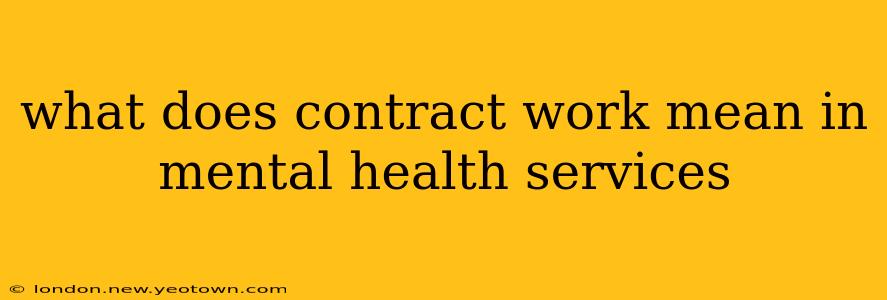What Does Contract Work Mean in Mental Health Services?
The world of mental health is constantly evolving, and with that evolution comes a variety of ways professionals can offer their services. One increasingly popular method is contract work. But what exactly does contract work mean in the context of mental health services? Let's unravel the intricacies of this flexible employment model.
Imagine this: Sarah, a highly skilled licensed therapist specializing in trauma, isn't interested in the traditional 9-to-5 office job. She prefers setting her own hours, choosing her clients, and having control over her workload. Instead of becoming a full-time employee at a clinic, Sarah opts for contract work. This means she provides services to clients or organizations on a project or assignment basis, typically for a predetermined fee or hourly rate, rather than receiving a salary as a full-time employee.
This scenario perfectly illustrates the core concept: contract work in mental health involves providing professional services under a contract, rather than through a permanent employment agreement.
What are the different types of contract work in mental health?
Contract work in mental health isn't a one-size-fits-all model. It takes several forms, each with its own nuances:
1. Independent Contractor: This is perhaps the most common type. Independent contractors work for themselves, setting their own rates, hours, and choosing which clients or organizations to work with. They’re responsible for their own taxes, insurance, and business expenses.
2. Contract Employee (Temporary): This differs slightly. While still working under a contract for a specific period, contract employees might receive some administrative support, such as payroll processing, from the hiring organization. However, they still lack the benefits and job security of a full-time employee.
3. Consulting: Mental health professionals might offer consulting services to organizations, such as schools, businesses, or healthcare facilities. This involves providing expert advice, training, or program development related to mental health.
4. Per-diem work: This involves providing mental health services on an as-needed basis, often filling in for absences or managing high demand periods.
What are the benefits of contract mental health work?
For mental health professionals, contract work offers several appealing advantages:
- Flexibility: Set your own hours, work remotely, and choose projects that align with your interests and expertise.
- Control: Manage your workload, client choices, and professional trajectory.
- Autonomy: Experience a greater sense of independence and control over your career.
- Potentially Higher Earning Potential: Depending on your skills and demand, contract work could lead to a higher income than a traditional salaried position.
What are the drawbacks of contract mental health work?
Despite its benefits, contract work isn't without its challenges:
- Income Instability: Income can fluctuate depending on the number of clients or projects secured.
- Lack of Benefits: Contract workers typically don't receive employer-sponsored health insurance, retirement plans, or paid time off.
- Administrative Burden: Managing your own taxes, insurance, and marketing can be time-consuming.
- Job Insecurity: Contracts are temporary, creating uncertainty about future work.
How does contract work impact client care?
It's crucial to note that contract work doesn't necessarily diminish the quality of client care. Many skilled and dedicated professionals thrive in this model, providing high-quality services. However, potential clients should inquire about the therapist’s experience, qualifications, and insurance coverage to ensure a suitable match.
How do I find contract mental health work?
Finding contract opportunities typically involves networking, online job boards, and directly contacting organizations that might need mental health professionals on a contract basis.
In conclusion, contract work in mental health services presents a viable and flexible employment option, offering autonomy and potentially higher earning potential. However, it's essential to carefully weigh the benefits against the potential drawbacks before committing to this career path. It’s a dynamic field with opportunities for those seeking independence and control over their professional journey.

